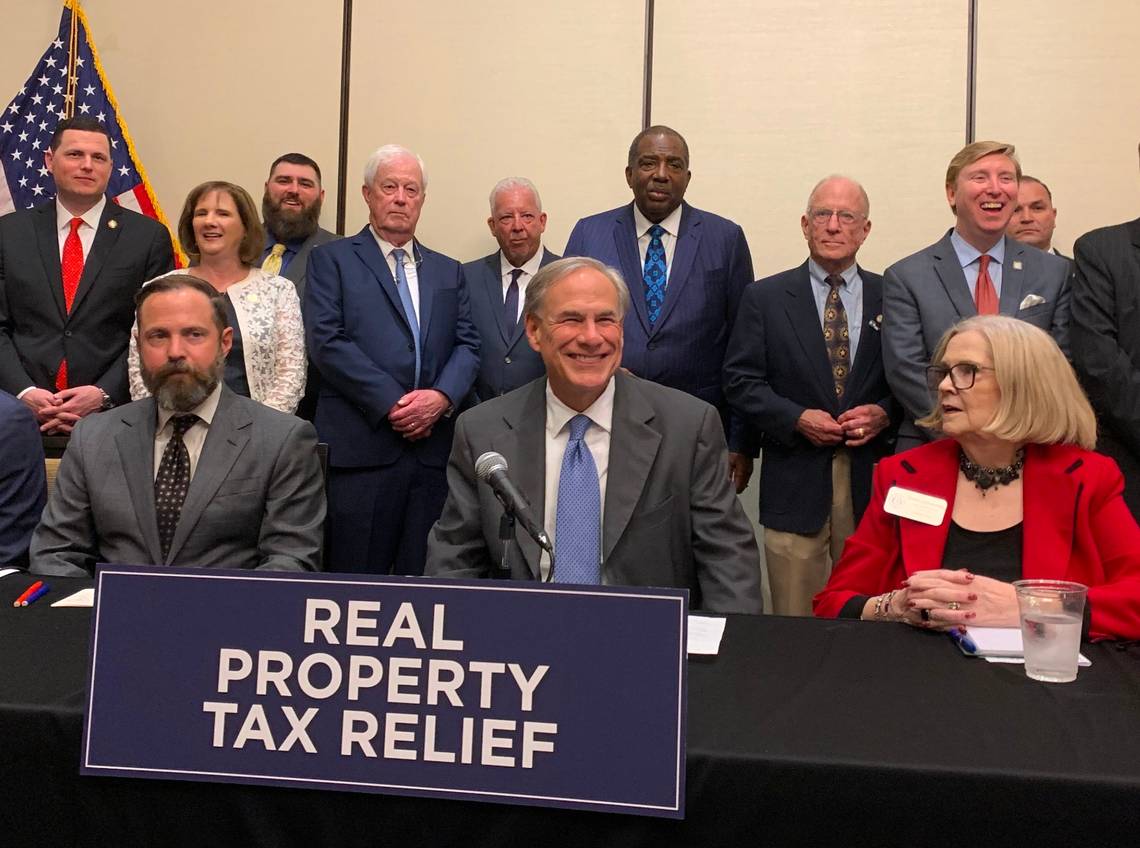TX Governor Greg Abbott Signs Property Tax Relief: See How Much You Can Save

Texas Gov. Greg Abbott signed three property tax exemption bills into law Monday to the delight of his Robson Ranch Republican Club audience.
Surrounded by about 20 state legislators, including House Speaker Dustin Burrows of Lubbock, Abbott signed Senate Bill 4, Senate Bill 23 and House Bill 9 during a ceremony at the Robson Ranch retirement community in Denton. The crowd of about 80 - some wearing cowboy hats and national colors, and one carrying a red elephant purse signed by the governor - applauded as Abbott held up the newly signed bills for them to see.
Denton County Commissioner Dianne Edmondson and the bills' authors, Houston Republican Sen. Paul Bettencourt and University Park Republican Rep. Morgan Meyer, joined Abbott.
Senate Bill 4 raises the homestead property tax exemption for schools from $100,000 to $140,000. Senate Bill 23 increases it to $200,000 for people who are 65 and older or disabled.
With the increased exemption, homeowners in the Fort Worth school district would save $425, based on the 2024 tax rate.
"Many of you all are good at math, some of you are better at reading," Abbott joked. "If you go for where the homestead exemption was when I first became governor, $15,000 to now $140,000 that's almost a 1,000% increase."
School taxes are the largest bulk of property tax bills.
House Bill 9 increases the personal property tax exemption, which affects businesses primarily, from $2,500 to $125,000.
"As far as I'm concerned, we're not done yet, there's more that we should do," Abbott said. "The state of Texas has four constitutional provisions that are spending limits for the state. Cities and counties, they don't have those same spending limits. It's time the cities and counties have a spending limit, just like the state of Texas does, so they cannot drive up your property taxes."
Burrows said the three bills, if approved by voters in November, are all going to make it easier to retire in Texas.
"No country, no state, no city, no county, can tax and spend their way into prosperity," Burrows said. "I'm going to make a bold prediction. I think Texas could become a retirement destination because of doing things like this."
Bettencourt pointed out a few state representatives at the event who will see 90% to 100% of their county residents pay no property taxes if voters approve the measures.
"And why not? You've paid a lifetime of taxes already," Bettencourt said. "And so here, the state of Texas makes the massive commitment to make sure that you can stay in your home for as long as you want to, because these exemptions, once you vote for them in November, will be there for as long as you own the home."
Since there's no state-level property tax and the state doesn't set local rates, lawmakers in Austin must take a "circuitous pathway" to offering relief, Abbott said in a June 11 interview with reporters.
That primarily happens through homestead exemption increases and using state dollars to "buy down" school property taxes, Abbott said. Essentially, Texas can inject money into schools that is then used to drive down rates.
"If we don't come in here every session and continue to devote tens of billions of dollars to maintain the reduction of the compression, that will lead to a property tax increase," Abbott said. "We are in this ongoing cycle where we're going to have to come in here every single session and devote larger amounts of money because of the way the system works."
Abbott advocated for local property tax rate decreases through state-imposed limits on increases.
"Local jurisdictions, in my opinion, have imposed too much property taxes on our fellow Texans," Abbott said. "We need to focus more, we in the Capitol need to focus more, on limiting how much property tax can be imposed by the local taxing authorities. That would lead to bonafide property tax cuts that would lead to lower property tax bills for our constituents, and that will be a keen focus of mine going forward."
The governor in February said he supports requiring approval from two-thirds of voters in an election to increase local property tax rates.
"That's a primary focal point of mine, and that's to make sure we accomplish even more by limiting the ability of the local property taxing jurisdictions to be able to continue to increase your property taxes," Abbott said.
Abbott referenced his campaign season efforts to elect Republican lawmakers who supported his "school choice" and bail reform priorities, suggesting a similar strategy on property taxes. Bills on both topics made it to Abbott's desk and were signed into law.
Abbott was able to move the needle on both issues, he said. But he wasn't "out in the trenches" in the same way when it comes to property taxes, Abbott said.
"I had not done something similar with regard to property taxes, and so I'm just thinking, well it worked with these two strategies, maybe it's time to employ the same strategy as it concerns property taxes," Abbott said.
Post a Comment for "TX Governor Greg Abbott Signs Property Tax Relief: See How Much You Can Save"
Post a Comment